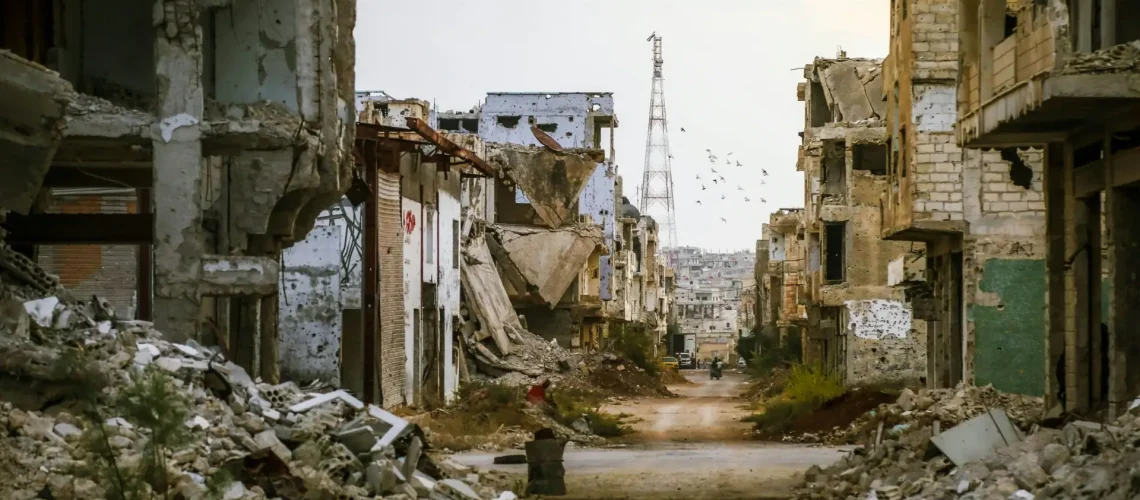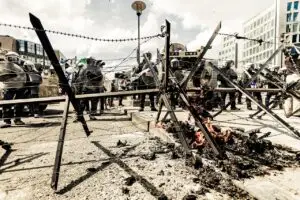The fall of Bashar al-Assad’s regime in Syria marks a turning point in the region’s turbulent history. Hayat Tahrir al-Sham (HTS), a group once linked to Al-Qaeda, has emerged as the dominant force in recent days, seizing control of significant territory, including Damascus. With Syria now under their command, the question arises: What does the future hold for a country devastated by over a decade of civil war?
The Rise of HTS and Its Implications
HTS, initially founded as Jabhat al-Nusra, was once a militant offshoot of Al-Qaeda. However, in recent years, the group has attempted to rebrand itself, claiming to have moderated its views. HTS now speaks of a “free Syria” and portrays itself as a stabilizing force. But skepticism remains high. Critics argue that its radical past and ongoing ties to extremist ideologies cannot be overlooked. The group’s ascendancy raises concerns about whether Syria is heading toward a state resembling Taliban-ruled Afghanistan or even the Islamic State’s caliphate.
HTS’s promises of moderation will be tested as it faces the monumental task of governing a fractured nation. The group must address not only the basic needs of millions of Syrians but also the rights of minorities such as Christians, Alawites, and women. Under Assad’s rule, these groups were often protected to varying degrees. Will HTS provide the same guarantees? Many fear a regression in women’s rights and increased marginalization of non-Sunni populations.
Sunni vs. Shia Dynamics
Syria’s population is deeply divided along sectarian lines, with Sunni Muslims making up the majority and Shia Muslims, including Assad’s Alawite sect, constituting a significant minority. The Assad regime’s fall signals a shift in this balance, likely empowering Sunni factions. However, this does not resolve the underlying tensions. Shia groups, backed by Iran, could resist HTS rule, further destabilizing the region. The lingering presence of the Islamic State (IS) adds another layer of complexity. HTS may face significant challenges in neutralizing IS cells, which remain active in parts of Syria.
The Role of Turkey and Qatar
Both Turkey and Qatar have long supported Sunni rebel groups in Syria, and HTS’s rise could align with their strategic interests. For Turkey, the stakes are particularly high. Hosting over 3.2 million Syrian refugees, Ankara is eager to facilitate their return. However, repatriation on a large scale is unlikely without a stable government and ongoing reconstruction. A war-torn and unstable Syria remains an unattractive destination for refugees, whether in Turkey, Europe, or elsewhere. Until meaningful progress is made, these populations will likely continue to seek safety and stability abroad.
The Kurdish Question
The Kurdish-controlled territories in northeastern Syria add another layer of complexity. The Kurds, who played a pivotal role in the fight against IS, still control approximately one-third of the country. HTS’s vision for Syria leaves little room for Kurdish autonomy, setting the stage for potential conflict. Such a clash would not only strain resources but also further fragment the nation. The possibility of a broader Kurdish push for independence raises additional concerns, especially for neighboring Turkey, which vehemently opposes the establishment of a Kurdish state.
Regional and Global Implications
Syria’s future will undoubtedly have ripple effects across the Middle East. Israel, already embroiled in tensions with Hamas and Hezbollah, will closely monitor developments in Damascus. A Sunni-dominated government under HTS could realign Syria’s alliances, potentially reducing Iranian influence in the region. Conversely, Tehran might double down on its support for Shia factions to maintain a foothold in the country.
For Europe, the fall of Assad could exacerbate the refugee crisis. Nations already struggling with migration policies may face increased pressure if Syria remains unstable. The EU must also grapple with the potential resurgence of terrorism, as radical groups exploit the chaos to expand their reach.
Scenarios for Syria’s Future
Several scenarios could play out in the coming months and years. In one, HTS consolidates power and establishes a government resembling that of the Taliban—authoritarian, but functional enough to maintain basic order. Alternatively, internal divisions and resistance from various factions, including IS and Kurdish groups, could plunge Syria into another cycle of civil war. A third possibility is the partitioning of Syria, with the Kurds gaining autonomy or even independence. However, such an outcome would likely provoke a strong response from Turkey and complicate regional dynamics further.
Conclusion: A Shrouded Future
The road ahead for Syria is uncertain. The emergence of HTS as the dominant force in the country could either pave the way for a new chapter of stability or lead to further chaos. While the group claims to seek a free and unified Syria, its ability to govern inclusively remains in question. Moreover, even if HTS succeeds in stabilizing the country, the scars of war, deep-seated divisions, and external influences will continue to shape Syria’s trajectory.
And what of the refugees? Until Syria achieves genuine stability and reconstruction begins in earnest, large-scale repatriation remains a distant dream. Whether for those in Turkey, Europe, or beyond, the prospect of returning to a fractured homeland is fraught with uncertainty.
Finally, we must consider the broader context. Are these unidentified flying objects truly extraterrestrial? Or could they represent visits from the future, a highly advanced AI, or even the creators of this grand experiment called “human life”? Perhaps they are observing, intervening occasionally to ensure their experiment’s survival. After all, if we spoke to an ant, could it understand us? Let’s hope, at the very least, that the experimenters don’t decide to wipe out the ant hill just because they feel like it.
Photo by Mahmoud Sulaiman on Unsplash






